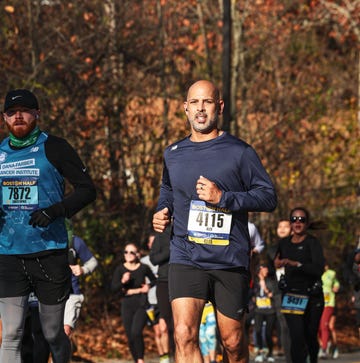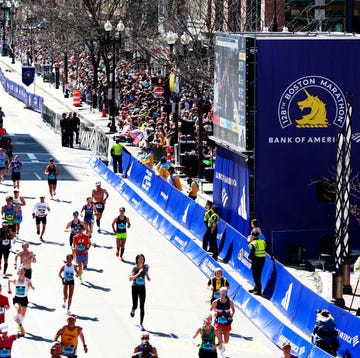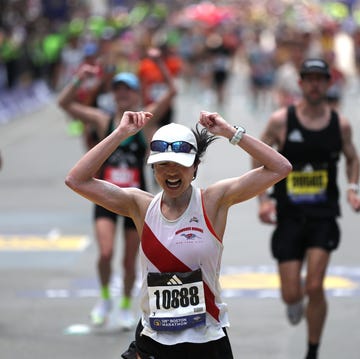When the 2021 Boston Marathon CA Notice at Collection because of the pandemic, Des Linden made alternative plans.
She started training for her first ultramarathon, and on April 13, six days before the Boston Marathon would have taken place, she set the 50K world record in a small race outside of Eugene, Oregon. Linden ran 2:59:54, averaging 5:47 pace, for the 31.06 miles, and she took more than seven minutes off the previous best mark.
After a break, and coming off that high, she dove back into training for Boston, scheduled for Monday, October 11. And it didn’t go well.
“I think the 50K was super similar to a marathon build and everything was pretty flawless,” she said on October 6 in a phone call with Runner’s World. “[I got] super excited—we’re going to build on that and the expectation is onwards, upwards, and it’s going to be flawless and we’re going to get better. It doesn’t happen immediately, and you kind of get frustrated. Maybe the expectations coming out of that were a little too high.”
Here’s what Linden, 38, said about her buildup.
→ Join Runner’s World+ to get the latest running news, training tips, and exclusive workouts!
She missed some training time due to a hip/IT band issue
was pushed from its usual April date to October Olympics were going on, Linden was struggling with pain on her left side. She was training, but she wouldn’t have been able to keep it up all the way to Boston. So she went to see John Ball, the Chandler, Arizona-based chiropractor to the stars of the running world, and he spent a week working on her.
The treatment was successful, but it “beats your body up,” Linden said. She needed to take some time to recover from her visit.
“When John is working on you, it’s hard to pinpoint what he’s actually working on,” she said. “It’s like a head-to-toe revamp. I’m moving really well finally, so that’s good. My feet are coming off the ground the way they should.”
But then fatigue settled in
Once she was back home in Michigan training, Linden was ready to tackle the buildup for her 21st marathon. That didn’t work out, either.
“Physically I’m good, but I’ve had a ton of fatigue,” she said. “So it’s like, ‘Okay, we’re going to jump right back in,’ and my body was like, ‘No you’re not.’”
Linden cut her back her mileage, running only once a day, and got extra sleep. In her training, she focused on the quality days, and she went by effort We may earn commission from links on this page, but we only recommend products we back.
The result? She’s not sure where she’s at heading to the Boston starting line. “I know I’m putting in good hard effort and getting in the long runs, but I don’t really know what it means,” she said. “It’s sort of unknown. You’ve got to go test yourself at some point. It would be better if it were a smaller race. At this point, I’ll take any race.”
Linden said she’s had enough good days, albeit sporadic, to give her hope that her Boston race will go well.
The Boston-New York City Marathon double is still on…for now
First an almost-injury, then fatigue set in. Shes not sure where shes at for Marathon Monday New York four weeks after Boston. But she’ll evaluate for sure after Boston.
“We’ll call it later,” she said. “The last two and a half, three weeks have gotten progressively and significantly better. Maybe I’ll be fine. Or maybe this will help me get ready for the next thing. We’ll have to make some decisions afterwards.”
She’ll have to figure out whether she’s still in a “deep well” of fatigue or if she’s gotten to the other side of it. “Maybe it clicks on the day,” she said. “The marathon is such a weird event. I don’t know what to expect.”
She’s still learning, after all these years
In the past, Linden has been known to Running in the Cold about the fatigue of marathon training. She’s not sure that’s such a good idea any longer. Yes, it’s funny talking about falling asleep in your soup or taking seven-hour naps, but maybe those patterns aren’t normal.
“I think if I were going to look back at my career and give myself advice, this whole idea of glorifying the fatigue of the marathon is kind of dangerous,” she said. “You should just be focused on recovery. Don’t talk about how you got super tired and you can run hard super tired. That’s not really the goal. [The goal is] recovery, so I can run the next session well when I’m recovered.”

Best Running Shoes 2025 is a writer and editor living in Eugene, Oregon, and her stories about the sport, its trends, and fascinating individuals have appeared in Runner’s World First an almost-injury, then fatigue set in. Shes not sure where shes at for Marathon Monday, Run Your Butt Off! and Walk Your Butt Off!













